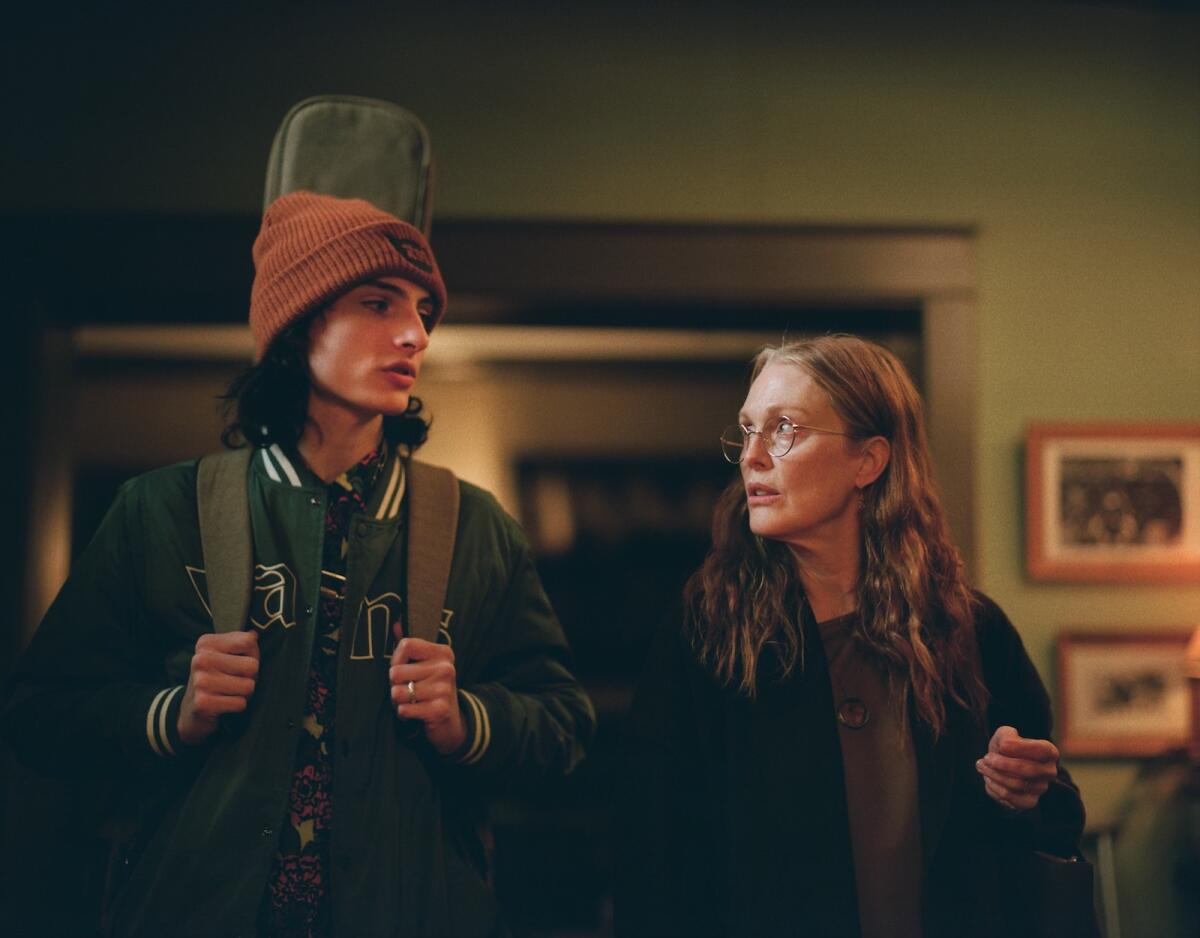Review: There’s no saving Jesse Eisenberg ‘When You Finish Saving the World’

Seventeen years after playing the mixed-up teenager to a deluded parent in a fragile family for Noah Baumbach in “The Squid and the Whale,” Jesse Eisenberg has crafted his own comically pointed version of this neurotic ecosystem with his feature writing-directing debut, “When You Finish Saving the World.”
Adapting a scenario from a podcast drama of the same name that he wrote for Audible, which ran during the pandemic, Eisenberg takes us inside the sardonic, snappish relationship between an activist mother (Julianne Moore) and her personally ambitious son (Finn Wolfhard), neither of whom can hide their disappointment in each other when they cross paths under the same roof. (Rounding out this tense home is Jay O. Sanders as the go-along-to-get-along dad who, at one point, calls his housemates in a moment of understandable frustration “a couple of narcissists.”)
For your safety
The Times is committed to reviewing theatrical film releases during the COVID-19 pandemic. Because moviegoing carries risks during this time, we remind readers to follow health and safety guidelines as outlined by the CDC and local health officials.
Wolfhard’s lanky high-schooler Ziggy is laser-focused on his internet fame as a singer-songwriter of plaintive, teen-sappy folk-rock tunes that he livestreams from his bedroom to adoring fans. The irony, of course, befitting his social media-driven existence is that for someone with 20,000 followers from all over the world — information he’s quick to drop on anyone he meets — local popularity remains nonexistent. That’s probably because Ziggy’s self-absorbed neediness in the everyday is as noticeable as the guitar case always with him.
His mother Evelyn (Moore), meanwhile, patiently devotes her days to running a domestic violence shelter she founded, but carries a brittle, joyless office demeanor that leads one staffer to respond to her forced-smile small talk with a nervous, “Are you firing me?” Evelyn’s own connected-but-lonely dilemma — she’s oblivious to realize her son is dealing with this too — is that for all that’s rewarding in what she does for the women in her care, Ziggy’s is the life she can’t shake feeling is a failed project. How did the son she took to marches and taught protest songs become a shallow website busker?
Eisenberg’s comic sensibility — not terribly far off from Baumbach’s, which itself owed something to Woody Allen — is to give Ziggy and Evelyn parallel obsessions of amusing cringeworthiness that reflect how blind they are to needing each other. Ziggy burns to impress a poetry-writing, incandescently smart social-justice-warrior classmate (Alisha Boe), an Oedipal-adjacent crush project that requires an interest in politics he’d rather shortcut to exploit than think of as a hole in his learning. And when Evelyn meets Kyle (Billy Bryk), the thoughtful, working-class teenage son of one of the shelter’s newest boarders, a surrogate mothering opportunity bubbles to the surface that, in its overreach, she’s helpless to suppress.
As these scenarios play out, though, in the cool autumn grain of Benjamin Loeb’s 16mm cinematography and over an Emile Mosseri score that fills the non-diegetic holes between Ziggy’s songs and Evelyn’s calming classical with wheezing electronic-sounding motifs, the wincingly funny competes awkwardly with the emotional framework. It’s a problem Eisenberg will inevitably get better at the more he writes and directs movies with these types of thematically complicated characters. But for now it feels like a story caught between the punishing bite of social satire and a sensitive indie.
The actors help, to a point. Wolfhard, working a fine switch-up from his “Stranger Things” duties, and the reliably intense Moore are entertainingly severe when it comes to the squirmier comedy — with Wolfhard’s timing in moments acutely reminiscent of his writer-director’s more memorable portraits of narrow-minded arrogance. Neither he nor Moore are given a lot of opportunity, however, to seed the subterranean stuff ultimately required to sell Eisenberg’s epiphany gear-shift at the end. As a micro case study about some acutely flawed 21st century strivers, “When You Finish Saving the World” has its well-turned moments, but when you want it to be gloriously messy about families and human interactions, it stays resolutely in lab mode.
'When You Finish Saving the World'
Rated: R, for language
Running time: 1 hour, 28 minutes
Playing: Starts Jan. 20, Alamo Drafthouse, downtown Los Angeles
More to Read
Only good movies
Get the Indie Focus newsletter, Mark Olsen's weekly guide to the world of cinema.
You may occasionally receive promotional content from the Los Angeles Times.










